Mercedes B Class vs Peugeot 3008 - Differences and prices compared
Compare performance (238 HP vs 325 HP), boot space and price (33100 £ vs 35100 £ ) at a glance. Find out which car is the better choice for you – Mercedes B Class or Peugeot 3008?
Costs and Efficiency:
Price and efficiency are often the first things buyers look at. Here it becomes clear which model has the long-term edge – whether at the pump, the plug, or in purchase price.
Mercedes B Class has a hardly perceptible advantage in terms of price – it starts at 33100 £ , while the Peugeot 3008 costs 35100 £ . That’s a price difference of around 2013 £.
Fuel consumption also shows a difference: Peugeot 3008 manages with 2.40 L and is therefore barely noticeable more efficient than the Mercedes B Class with 2.50 L. The difference is about 0.10 L per 100 km.
As for electric range, the Peugeot 3008 performs convincingly better – achieving up to 698 km, about 615 km more than the Mercedes B Class.
Engine and Performance:
Power, torque and acceleration say a lot about how a car feels on the road. This is where you see which model delivers more driving dynamics.
When it comes to engine power, the Peugeot 3008 has a distinct edge – offering 325 HP compared to 238 HP. That’s roughly 87 HP more horsepower.
In acceleration from 0 to 100 km/h, the Peugeot 3008 is slight quicker – completing the sprint in 6 s, while the Mercedes B Class takes 6.50 s. That’s about 0.50 s faster.
In terms of top speed, the Mercedes B Class performs to a small extent better – reaching 250 km/h, while the Peugeot 3008 tops out at 220 km/h. The difference is around 30 km/h.
There’s also a difference in torque: Peugeot 3008 pulls slightly stronger with 511 Nm compared to 450 Nm. That’s about 61 Nm difference.
Space and Everyday Use:
Whether family car or daily driver – which one offers more room, flexibility and comfort?
Both vehicles offer seating for 5 people.
In curb weight, Mercedes B Class is a bit lighter – 1405 kg compared to 1648 kg. The difference is around 243 kg.
In terms of boot space, the Peugeot 3008 offers a bit more room – 520 L compared to 455 L. That’s a difference of about 65 L.
In maximum load capacity, the Mercedes B Class performs slight better – up to 1540 L, which is about 60 L more than the Peugeot 3008.
When it comes to payload, Mercedes B Class slightly takes the win – 550 kg compared to 467 kg. That’s a difference of about 83 kg.
Who wins the race in the data check?
The Peugeot 3008 is clearly superior overall in the objective data comparison.
This result only shows which model scores more points on paper – not which of the two cars feels right for you.
Costs and Consumption
View detailed analysis
Engine and Performance
View detailed analysis
Dimensions and Body
View detailed analysis
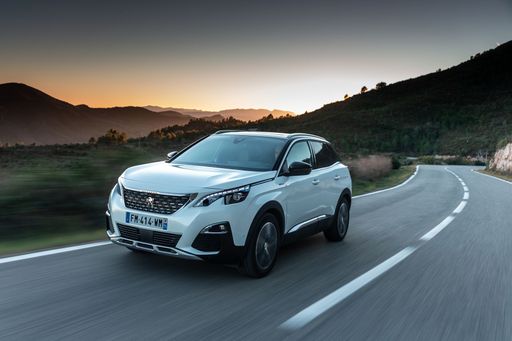
Peugeot 3008
Mercedes B Class
The Mercedes B-Class is a smart, grown-up compact people carrier that dresses everyday practicality in a near‑premium polish, perfect for buyers who want comfort and a classy badge without the theatrics. It won’t set your pulse racing on a back road, but it will make school runs, commutes and grocery hauls feel pleasantly civilized — a reliable, slightly posh companion for real life.
details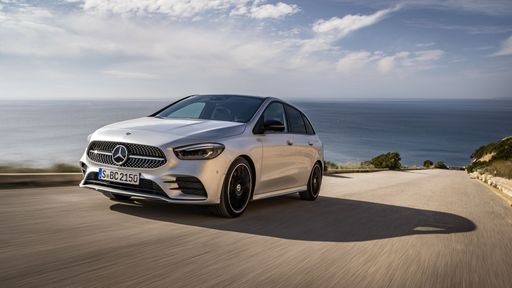
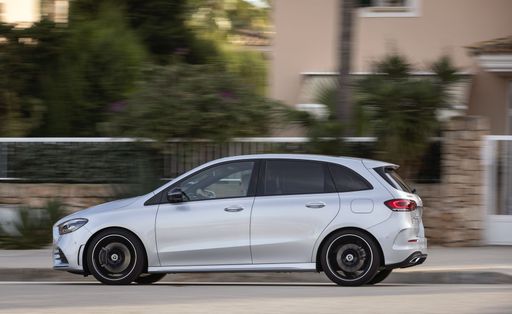
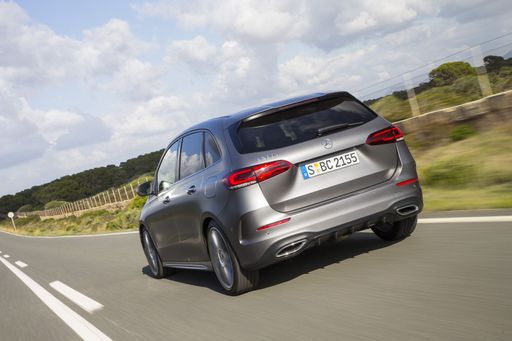
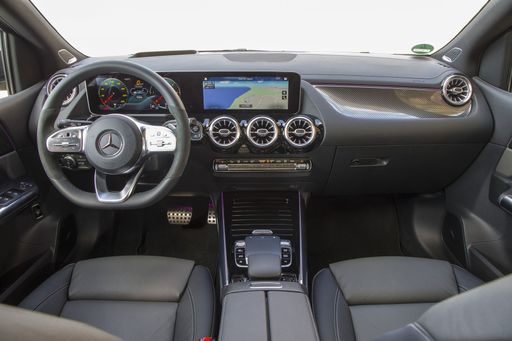
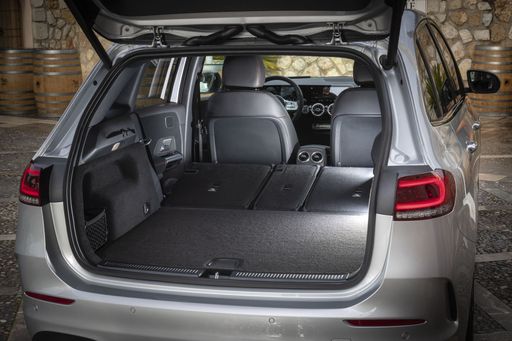
Peugeot 3008
The Peugeot 3008 blends bold French styling with a surprisingly grown-up interior that makes even dull commutes feel a little bit special. Practical enough for family life yet lively to drive, it’s a clever all‑rounder that stands out from the crossover crowd without shouting for attention.
details
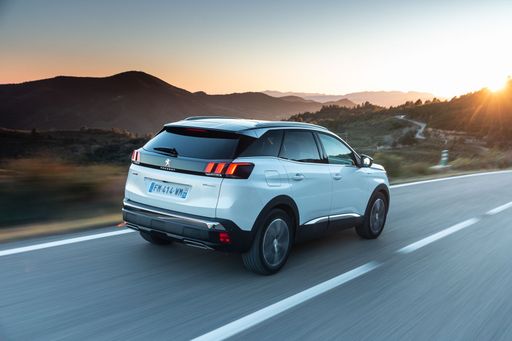

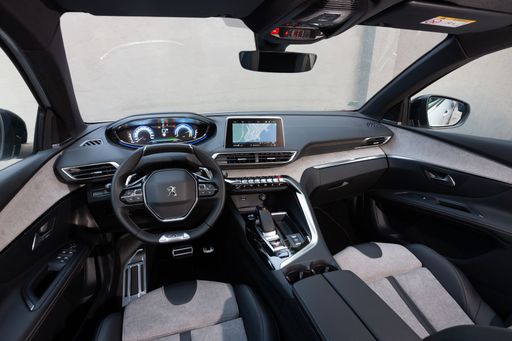
Costs and Consumption |
|
|---|---|
|
Price
33100 - 52500 £
|
Price
35100 - 52000 £
|
|
Consumption L/100km
2.5 - 6.9 L
|
Consumption L/100km
2.4 - 5.4 L
|
|
Consumption kWh/100km
-
|
Consumption kWh/100km
16.9 - 17.6 kWh
|
|
Electric Range
83 km
|
Electric Range
81 - 698 km
|
|
Battery Capacity
12.90 kWh
|
Battery Capacity
0.4 - 96.9 kWh
|
|
co2
56 - 156 g/km
|
co2
0 - 121 g/km
|
|
Fuel tank capacity
35 - 51 L
|
Fuel tank capacity
55 L
|
Dimensions and Body |
|
|---|---|
|
Body Type
MPV
|
Body Type
SUV
|
|
Seats
5
|
Seats
5
|
|
Doors
5
|
Doors
5
|
|
Curb weight
1405 - 1745 kg
|
Curb weight
1648 - 2266 kg
|
|
Trunk capacity
405 - 455 L
|
Trunk capacity
470 - 520 L
|
|
Length
4419 mm
|
Length
4542 mm
|
|
Width
1796 mm
|
Width
1895 mm
|
|
Height
1562 mm
|
Height
1641 mm
|
|
Max trunk capacity
1440 - 1540 L
|
Max trunk capacity
1430 - 1480 L
|
|
Payload
505 - 550 kg
|
Payload
432 - 467 kg
|
Engine and Performance |
|
|---|---|
|
Engine Type
Plugin Hybrid, Petrol MHEV, Diesel
|
Engine Type
Electric, Petrol MHEV, Plugin Hybrid
|
|
Transmission
Automatic
|
Transmission
Automatic
|
|
Transmission Detail
Dual-Clutch Automatic
|
Transmission Detail
Reduction Gearbox, Dual-Clutch Automatic
|
|
Drive Type
Front-Wheel Drive, All-Wheel Drive
|
Drive Type
Front-Wheel Drive, All-Wheel Drive
|
|
Power HP
116 - 238 HP
|
Power HP
145 - 325 HP
|
|
Acceleration 0-100km/h
6.5 - 10 s
|
Acceleration 0-100km/h
6 - 10.2 s
|
|
Max Speed
200 - 250 km/h
|
Max Speed
170 - 220 km/h
|
|
Torque
200 - 450 Nm
|
Torque
230 - 511 Nm
|
|
Number of Cylinders
4
|
Number of Cylinders
3 - 4
|
|
Power kW
85 - 175 kW
|
Power kW
107 - 239 kW
|
|
Engine capacity
1332 - 1991 cm3
|
Engine capacity
1199 - 1598 cm3
|
General |
|
|---|---|
|
Model Year
2024 - 2025
|
Model Year
2024 - 2025
|
|
CO2 Efficiency Class
B, D, E, F
|
CO2 Efficiency Class
A, D, B
|
|
Brand
Mercedes-Benz
|
Brand
Peugeot
|
What drivetrain options does the Mercedes B Class have?
The Mercedes B Class is offered with Front-Wheel Drive or All-Wheel Drive.
